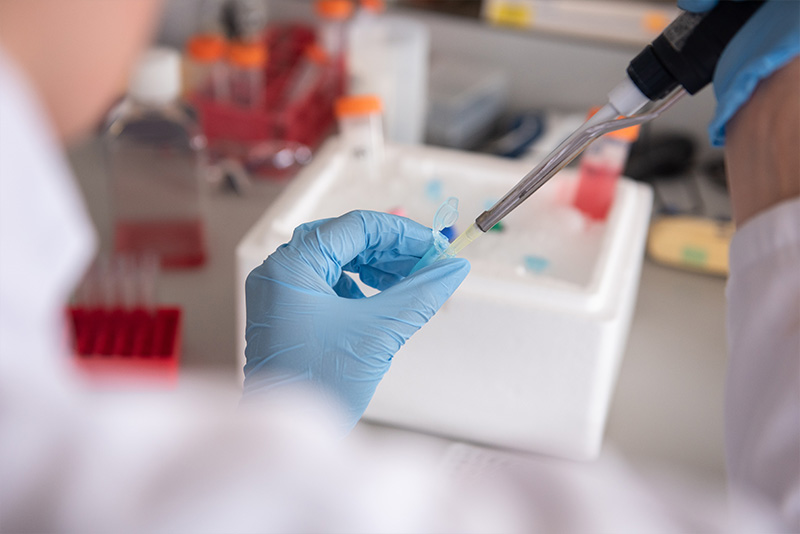Combating COVID-19
Throughout 2020 researchers at the University have been at the forefront of coronavirus-related work. Donor support at all levels has boosted Oxford’s efforts across a wide range of areas; here are some examples of the impact this is making.
Leading the way in pandemic research
Researchers at Oxford have been playing a leading role in tackling the challenges of the coronavirus. From rapid vaccine and drug development to furthering our understanding of the mental health implications of the pandemic, experts from across the University are at the forefront of global efforts to mitigate the effects of COVID-19.
Donor support has had a significant impact on the University’s ability to react quickly to the crisis, with gifts of all sizes enabling Oxford to accelerate research in a number of key areas. Alongside wide-ranging support from members of the public, a variety of major gifts have been instrumental both in fast-tracking Oxford’s COVID-19 work and in ensuring greater preparedness for potential future outbreaks.
 Vaccine research at Oxford. Photo by John Cairns/Medical Sciences Division
Vaccine research at Oxford. Photo by John Cairns/Medical Sciences Division
Generous donations have helped to endow two key professorships in the field of vaccine research and development. As well as boosting current work on COVID-19, this support will help Oxford to continue to deploy its world-leading expertise in vaccine development for generations to come. As well as supporting academic posts, donors are funding graduate scholarships in the field, providing opportunities for the vaccine specialists of the future to further their knowledge.
In other areas, major gifts have been helping the University to address a broad range of mental health issues arising from the coronavirus, such as feelings of isolation, anxiety and disconnection from social networks. This work is not only having an impact in the present; it will also help to build resilience in the face of future crises.
Research with the potential to improve preparedness for any subsequent novel pathogen outbreaks was also boosted through a gift to the Department of Zoology, which enabled researchers to conduct a UK cross-sectional survey into the level of community-based infection of COVID-19. By understanding the prevalence of the virus, public health authorities are better placed to implement an informed response.
Regius Professor of Medicine Sir John Bell said: ‘Donor generosity has been instrumental in enabling the University to respond so swiftly to this unprecedented situation. While we continue to make progress on a wide range of issues arising from COVID-19, we are also determined to ensure that Oxford is at the forefront of ongoing efforts to mitigate the impact of future pandemics. Thank you to everyone who is supporting us.’
Enabling a rapid response to COVID-19
In addition to a range of major gifts in support of Oxford’s coronavirus research activities, the public have also provided tremendous support for this vital work. Launched in April 2020, the COVID-19 Research Response Fund (CRRF) has harnessed the power of collaborative giving and donations of all sizes have made a significant impact on the University’s ability to respond rapidly to the virus.
By the end of August over £8 million had been deployed through the CRRF, which has awarded funding on a competitive basis for near-term, urgent COVID-19 research. This has enabled the University to target high-priority research capable of having an immediate impact across areas such as vaccine development, drug delivery, mental health and the socio-economic fallout of the pandemic.
 Amol Neupane cycled 300 kilometres in ten days to raise money for Oxford’s COVID-19 research. Photo by Hari Neupane
Amol Neupane cycled 300 kilometres in ten days to raise money for Oxford’s COVID-19 research. Photo by Hari Neupane
The fund has attracted gifts from all around the world, with a number of supporters even setting up their own fundraising drives via the University’s Virgin Money Giving page. For example, over £65,000 was raised by people undertaking a range of extraordinary challenges and projects, including a 36-hour sports ‘coronathon’, a virtual cycle ride across the USA and the release of a song, ‘Hand of Hope’, penned by Alexander McCall Smith. The work being done at Oxford has inspired people of all ages too: Jack Burston (13) and Amol Neupane (9) took on challenges of their own involving swimming and cycling and have raised over £7,000 between them.
Professor Gavin Screaton, Head of the Medical Sciences Division, said: ‘The support that we have received has been incredible and we are enormously grateful to everyone for their contribution. Flexible funding is of paramount importance and donations of any size are truly vital in enabling us to accelerate innovative and time-critical research. This collective effort has made a significant difference and every gift is having a real impact in funding research that will help us contain or end this pandemic.’
Assisting the student and staff community
While COVID-19 has disrupted life across every aspect of the collegiate University, a significant number of staff and students, particularly those studying at the graduate level, have been confronted with financial hardship. While many students have faced the possibility of having to suspend or extend their studies due to loss of income from holiday work or having to pay for additional rent, a number of staff members have also struggled to cope financially, for example where their partner has been made redundant.
In response to this, a student and staff hardship appeal was launched in May 2020 to provide emergency support and to ensure the viability of continuation of study for Oxford’s student population. By the end of August, more than £650,000 had been raised from over 470 donors, including generous support from Crankstart, Santander and donors who have given via the Vice-Chancellor’s discretionary fund. The donations are being deployed immediately to support those most in need. Over 300 applications have been made to the fund, with more expected as the ongoing impact of the crisis becomes apparent.
‘Without access to hardship funding, I would not have been able to pay my rent for the last two months of my studies’
A graduate student from Linacre College underlined the significance of this support: ‘I was doing my MSc in Social Anthropology and had been supporting my living costs with a part-time research fieldwork position. When the pandemic hit, my funding was frozen. Without access to hardship funding, I would not have been able to meet my living expenses and pay for my rent for the last two months of my studies.’
SUPPORT OXFORD'S CORONAVIRUS RESEARCH
DONATE TO THE CORONAVIRUS HARDSHIP FUND